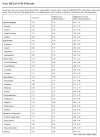The HEXACO model of personality structure is a six-dimensional model of human personality that was created by Ashton and Lee based on findings from a series of lexical studies involving several European and Asian languages. The six factors, or dimensions, include Honesty-Humility (H), Emotionality (E), Extraversion (X), Agreeableness (A), Conscientiousness (C), and Openness to Experience (O). Each factor is composed of traits with characteristics indicating high and low levels of the factor. The HEXACO model was developed through similar methods as other trait taxonomies and builds on the work of Costa and McCrae and Goldberg. The model, therefore, shares several common elements with other trait models. However, the HEXACO model is unique mainly due to the addition of the Honesty-Humility dimension.
The HEXACO model of personality
The HEXACO model of personality conceptualizes human personality in terms of six dimensions.
The HEXACO model was developed from several previous independent lexical studies. Language based taxonomies for personality traits have been widely used as a method for developing personality models. This method, based on the logic of the lexical hypothesis, uses adjectives found in language that describe behaviours and tendencies among individuals. The identified adjectives are distilled down through factor analysis to yield a manageable number of groups of related personality traits.
Research studies based on the lexical hypothesis described above were first undertaken in the English language. Subsequent research was conducted in other languages, including Croatian, Dutch, Filipino, French, German, Greek, Hungarian, Italian, Korean, Polish, and Turkish. Comparisons of the results revealed as many as six emergent factors, in similar form across different languages including English. The six factors are generally named Honesty-Humility (H), Emotionality (E), Extraversion (X), Agreeableness (A), Conscientiousness (C), and Openness to Experience (O). The personality-descriptive adjectives that typically belong to these six groups are as follows:
Honesty-Humility (H): sincere, honest, faithful, loyal, modest/unassuming versus sly, deceitful, greedy, pretentious, hypocritical, boastful, pompous
Emotionality (E): emotional, oversensitive, sentimental, fearful, anxious, vulnerable versus brave, tough, independent, self-assured, stable
Extraversion (X): outgoing, lively, extraverted, sociable, talkative, cheerful, active versus shy, passive, withdrawn, introverted, quiet, reserved
Agreeableness (A): patient, tolerant, peaceful, mild, agreeable, lenient, gentle versus ill-tempered, quarrelsome, stubborn, choleric
Conscientiousness (C): organized, disciplined, diligent, careful, thorough, precise versus sloppy, negligent, reckless, lazy, irresponsible, absent-minded
Openness to Experience (O): intellectual, creative, unconventional, innovative, ironic versus shallow, unimaginative, conventional
Personality is often assessed using a self-report inventory or observer report inventory. The six factors are measured through a series of questions designed to rate an individual on levels of each factor.[7] Ashton and Lee have developed self- and observer report forms of the HEXACO Personality Inventory-Revised (HEXACO-PI-R).[8] The HEXACO-PI-R assesses the six broad HEXACO personality factors, each of which contains four "facets", or narrower personality characteristics. (An additional 25th narrow facet, called Altruism, is also included and represents a blend of the Honesty-Humility, Emotionality, and Agreeableness factors.) The four facets within each factor are as follows:
Honesty-Humility (H): Sincerity, Fairness, Greed Avoidance, Modesty
Emotionality (E): Fearfulness, Anxiety, Dependence, Sentimentality
Extraversion (X): Social Self-Esteem, Social Boldness, Sociability, Liveliness
Agreeableness (A): Forgivingness, Gentleness, Flexibility, Patience
Conscientiousness (C): Organization, Diligence, Perfectionism, Prudence
Openness to Experience (O): Aesthetic Appreciation, Inquisitiveness, Creativity, Unconventionality
Relations with the "Big Five" FFM personality factors
Currently, the most widely used model of personality structure is also based on analyses of personality-descriptive adjectives. This model consists of the five personality factors collectively known as the "Big Five". Three of the Big Five factors are similar to the Extraversion, Conscientiousness, and Openness to Experience factors of the HEXACO model. The two remaining Big Five factors, called Agreeableness and Neuroticism (with the opposite pole of the latter factor being Emotional Stability), are similar to the Agreeableness and Emotionality factors of the HEXACO model – but with some differences in the content of the factors. Agreeableness and Emotionality from the HEXACO model represent rotated variants of their Big Five counterparts, for example, characteristics related to a quick temper are associated with Neuroticism or low Emotional Stability in the Big Five framework, but with low Agreeableness in the HEXACO framework. Therefore, the Big Five's Agreeableness and HEXACO's Agreeableness are not identical. The Big Five factors do not include an Honesty-Humility factor, but some of the characteristics belonging to Honesty-Humility are incorporated into the Big Five's Agreeableness factor. Although earlier investigations found only the Big Five factors, more recent studies conducted in various languages (including English) with larger sets of adjectives recovered six factors, as summarized above. The names of four of the HEXACO factors (all except Honesty-Humility and Emotionality) were adopted from existing labels for the Big Five factors. Factor names were selected on the basis of the common meaning of the characteristics within each factor.






